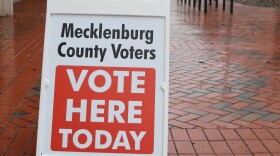Rachel Brady came to the legislature Wednesday with three young sons in tow. She's a mom of four from Wake Forest. Her soon-to-be third grader received an Opportunity Scholarship this year worth thousands of dollars toward his private school tuition — but her younger son who is starting kindergarten did not.
"He is one of the 55,000 children wait-listed to receive the scholarship this year," Brady said.
If new legislation hadn't passed, both her sons would have likely received a voucher under the old eligibility rules. But because her family isn't in the lowest income tier of applicants, high demand pushed her kindergartner onto the wait list.

Legislators committed $191.5 million for Opportunity Scholarships for this upcoming school year, and the state agency that administers the program says it has exhausted those funds. A bill to spend an additional $248 million to help clear the waitlist has stalled.
When lawmakers paused budget negotiations in July, Brady was stunned.
"We were told time and time again, 'We're gonna get this done,'" Brady said. "And I watched in horror and utter frustration around July 4, when the legislature decided to pick up and go home and not get this done. They did not keep their promise."
That frustration inspired her to reach out to dozens of other wait-listed families and gather outside the General Assembly this week.
"We're here to put faces and handprints to this issue," Brady said at the podium, addressing her comments to Republican lawmakers. "We're here to support you. We applaud your school choice efforts, but we are not going to be forgotten."
Brady then hand delivered a letter to House Speaker Tim Moore asking for funding.

Moore said Wednesday that lawmakers are unlikely to pass more voucher funding before the new school year, given that Governor Roy Cooper is expected to veto it. But Moore also said he's in favor of passing more funding for vouchers in the next few months.
"What I've committed to do is once we fund this to ensure that it's retroactive, that these families who have relied upon this will be able to receive that funding," Moore said.
Moore added that he thinks the legislature should use the state's surplus tax revenue to increase funding for traditional public schools while also paying for the voucher waitlist.
Uncertainty in voucher funding leaves enrollment up in the air for schools
Delayed funding puts private school administrators in a bind for the coming school year, just as it does for parents. Bryan Wolfe heads the Winston Salem Christian School, a private school that serves more than 400 students from kindergarten through twelfth grade.
"We probably have about 50 families that are kind of waiting to see what happens, and so it's put us in a difficult spot as a school, trying to figure out how many people are going to be in this class," Wolfe said.
That's a challenge for public schools too, as administrators wonder how many students might use vouchers to switch to private schools. Wolfe says his school has had more interest from new families this year.
"And it was primarily people that were in hopes of getting the Opportunity Scholarship and have not gotten it at this point," Wolfe added.
Democrats and public school advocates worry what this uncertainty means for public schools that might lose students — and state funding.
"I think that taxpayer funded vouchers is bad public policy, because you inevitably are going to prioritize paying for relatively affluent families to send their kids to private school, at the expense of fully funding and supporting our traditional public schools," said Democratic state Senator Graig Meyer, who serves Orange, Person and Caswell Counties.

Not all the families on the waitlist are considered wealthy. About a third are mid-tiered with a household income under $115,000 for a family of four. Still, most on the waitlist have a household income that's higher than two-thirds of North Carolinians', based on an analysis by WUNC.
Meyer said Democratic lawmakers are looking to Arizona as a cautionary tale of what that expense could do to the state budget long term.
"We've seen that when Arizona expanded vouchers to have no income cap and unlimited availability that they essentially broke their budget," Meyer said.
This year, Arizona had a $1.4 billion shortfall, and reporting by ProPublica found the voucher expansion was a major factor. But North Carolina has a budget surplus this year.
Meyer said Democrats will continue to oppose private school vouchers, and whether Republican lawmakers fund the Opportunity Scholarship waitlist this year or not, it's an issue that will likely resurface in the future.
Correction: A prior version of this story incorrectly stated how many grades Winston Salem Christian School serves.







